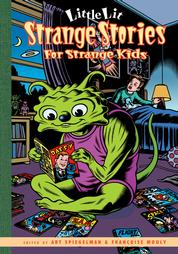 Give Art Spiegelman the Truth In Titling Award. I bought Strange Stories for Strange Kids, Book Two in the Little Lit series he edited, which brings together well known graphic novel and comic book artists as well as other writers and artists [e.g., Richard McGuire, David Sedaris & Olivia creator Ian Falconer] into a cool anthology of stories for kids.
Give Art Spiegelman the Truth In Titling Award. I bought Strange Stories for Strange Kids, Book Two in the Little Lit series he edited, which brings together well known graphic novel and comic book artists as well as other writers and artists [e.g., Richard McGuire, David Sedaris & Olivia creator Ian Falconer] into a cool anthology of stories for kids.
Now my kid's just as advanced for her age as the next kid, but I saw nothing but downside in reading to a 2-yo about a kid picking a clone out of his nose, or telling her about Paul Auster's tale of existential dread at waking up invisible. Even the happy ending of the Falconer/Sedaris story, where the girl turns her head inside out so she can be ugly again like her family seemed a bit much.
I'll let you know in a few years if all 5-10 year-olds are freakin' weirdos--I hold out the possibility that they are--but in the mean time, I think we've hit a wall with the kid, where her raw ability to take things in has run far ahead of her actual life experience. She hasn't learned what "ugly" or "fat" or "bored" or "stupid" or "lonely" or "hate" or "kill" is yet, and we're in no hurry to teach her. Is that over-protective? Prudish? Hopelessly naive? Fine.
In any case, Strange Stories for Strange Stories turns out not to be for kids at all; it's for five-year-olds.


I would give the fairy tales entry in the series a guarded endorsement, though the stories pall a trifle after the first forty or fifty readings. At least you get some counterpoint to the Princess-Industrial complex.
Though both the fairy tales title and the Dark and Silly Night can get a little Gothic at times. On the upside, the ability to read ahead and bowdlerize text concurrent with reading aloud would seem to point up some cognitive ability I didn't possess before I had a kid.
I'm guessing this isn't for "normal" young kids.
Unless you belong to Danny Elfman or David Hasselhoff.
This was actually one of my favorite books as a child. Believe it or not, this story teaches valuable lessons and broaden's children's skills on word play and creativity. The comics and obscurity capture the reader's attention and holds it throughout the book, so the kids could learn life lessons while having fun. For example: The story of the girl turning her self inside out is kind of a reference to what beauty really is. She was showing her ''insides'' and that made her beautiful because true beauty is on the inside.